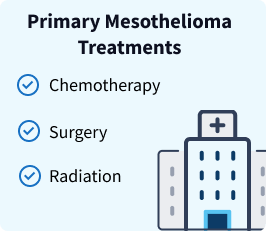
Mesothelioma Treatment
Chemotherapy is typically the main treatment for mesothelioma. Treatment may also include surgery, radiation therapy and immunotherapy. These treatments can help manage symptoms, improve quality of life and extend life expectancy.
Written byDr. Daniel A. Landau•Edited ByWalter Pacheco•Medically Reviewed ByDr. Jacques Fontaine
Asbestos.com is the nation’smost trustedmesothelioma resource
The Mesothelioma Center at Asbestos.com has provided patients and their loved ones the most updated and reliable information on mesothelioma and asbestos exposure since 2006.
Our team of Patient Advocates includes a medical doctor, a registered nurse, health services administrators, veterans, VA-accredited Claims Agents, an oncology patient navigator and hospice care expert. Their combined expertise means we help any mesothelioma patient or loved one through every step of their cancer journey.
More than 30 contributors, including mesothelioma doctors, survivors, health care professionals and other experts, have peer-reviewed our website and written unique research-driven articles to ensure you get the highest-quality medical and health information.
About The Mesothelioma Center at Asbestos.com
- Assisting mesothelioma patients and their loved ones since 2006.
- Helps more than 50% of mesothelioma patients diagnosed annually in the U.S.
- A+ rating from the Better Business Bureau.
- 5-star reviewed mesothelioma and support organization.
Testimonials
My family has only the highest compliment for the assistance and support that we received from The Mesothelioma Center. This is a staff of compassionate and knowledgeable individuals who respect what your family is experiencing and who go the extra mile to make an unfortunate diagnosis less stressful. Information and assistance were provided by The Mesothelioma Center at no cost to our family.LashawnMesothelioma patient’s daughter
How to Cite Asbestos.com’s Article
APA
Landau, D. A. (2023, October 5).Mesothelioma Treatment.Asbestos.com. Retrieved October 11, 2023, from //www.magnakarsa.com/treatment/
MLA
Landau, Daniel A. "Mesothelioma Treatment."Asbestos.com, 5 Oct 2023, //www.magnakarsa.com/treatment/.
Chicago
Landau, Daniel A. "Mesothelioma Treatment." Asbestos.com. Last modified October 5, 2023. //www.magnakarsa.com/treatment/.
- The main treatment options for mesothelioma include surgery, radiation therapy and chemotherapy.
- Targeted therapy, immunotherapy and palliative care can manage symptoms and improve quality of life.
- Treatment depends on the cancer stage.
- Surgical options include removing the pleura or the affected lung and HIPEC.
- Thoracentesis and pleurodesis can reduce fluid buildup and relieve symptoms.
- Mesothelioma clinical trials test new treatments, such as immunotherapy.

How Is Mesothelioma Treated?
The primary mesothelioma treatment options include chemotherapy, radiation therapy and surgery. These cancer treatments are determined based on the specific diagnosis, which involves imaging tests like CT scans and a biopsy. Factors such as the stage of the cancer play a crucial role in designing a personalized treatment plan to ensure effective care.
- Chemotherapy
- Clinical trials
- Immunotherapy
- Multimodality treatment
- Palliative treatment
- Radiation therapy
- Surgery
- Targeted therapy
Discuss your goal with your doctor when making a treatment plan. Do you want to focus on feeling better or extending survival? A health care team of specialists will work together to create your personalized cancer treatment plan. Amultimodal treatmentplan uses several approaches, such as surgery with chemotherapy.

Surgery
Mesothelioma surgery aims to remove cancerous tissue or improve symptoms. Not all patients are eligible for surgery. It is vital to discuss with a doctor if it is an appropriate treatment option for you.
Patients eligible formesothelioma surgerymost often include those in good health. They tend to have early-stage mesothelioma with removable tumors. Common surgeries for mesothelioma include:
- Cytoreductive Surgery with Heated Chemotherapy (HIPEC). This procedure removes tumors in the abdominal cavity. The patient then receives a heated chemotherapy wash to the affected area. Peritoneal mesothelioma patients benefit most from HIPEC.
- Extrapleural Pneumonectomy (EPP). This surgery is more involved and removes the entire cancerous lung. It also removes the pleural lining, the diaphragm and any visible tumors in the chest cavity.
- Pleurectomy and Decortication (P/D). This procedure removes the pleura, the thin membrane that lines the lungs. It also removes any visible tumors on the lung or chest wall.
Surgical benefits may include improved quality of life, symptom relief and extended survival. There are also risks associated with surgery. These include infection, bleeding and damage to surrounding tissues.
The development of a positive attitude is absolutely critical for patients and their survival, from surgery going forward after the operation.Dr. David SugarbakerMesothelioma Surgeon
为延长间皮瘤手术是一种可行的选择ing life expectancy or reducing symptoms. It is crucial to consider the potential risks. Discuss goals with your doctor to determine if surgery is the right choice.

Chemotherapy
Chemotherapy for mesothelioma uses drugs to kill cancer cells or prevent growth. It’s a standard option for patients who are not eligible for surgery. Doctors often use chemo in combination with other cancer treatments.
Patients with any stage of cancer are eligible forchemotherapy. Those with advanced-stage mesothelioma or who are not surgical candidates may benefit more. Physicians may give chemotherapy drugs alone or with other medications. Common mesotheliomachemo drugsinclude:
- Carboplatin
- Cisplatin
- Cyclophosphamide
- Doxorubicin
- Gemcitabine (Gemzar)
- Pemetrexed (Alimta)
- Raltitrexed
- Vinorelbine
The benefits of chemotherapy include improved symptom relief and a longer life expectancy. Risks associated with chemotherapy include various side effects. They tend to involve nausea, fatigue and potential damage to healthy cells.
我knew what chemotherapy and radiation were all about. I knew how important it was to get the right doctors, nurses, the expertise you need.Charles WoodPleural Mesothelioma Survivor
Some patients receiveTumor Treating Fieldstherapy and standard chemotherapy. This treatment uses electrical fields to disrupt cancer cell division.
Mesothelioma chemotherapy is a viable treatment option for most patients. It can benefit those who are not eligible for surgery or want to improve their chances of survival. It’s vital to consider the potential risks. Discuss your goals with amesothelioma doctorto determine if chemotherapy is the right choice for you.

Radiation Therapy
Radiation therapy is a standard treatment for mesothelioma. It uses high-energy radiation to destroy cancer cells and shrink tumors. Physicians may combine it with other therapies. It’s often an option for patients who are not eligible for surgery or chemotherapy.
Patients eligible forradiation therapyinclude those with localized or advanced-stage mesothelioma. If you have already had surgery, you may still be eligible. The most common types of radiation therapies used for mesothelioma include:
- Brachytherapy.A radiologist places radioactive material into or near the tumor.
- External Beam Radiation Therapy.Radiation from a machine outside the body directs treatment to the cancerous area.
- Stereotactic Body Radiation Therapy.In a few treatments, precise, high-dose radiation targets the tumor.
The benefits of radiation include reduced symptoms and an extended life expectancy. There are also risks and side effects associated with radiation therapy. These include fatigue, skin irritation and damage to healthy cells.
If you’re not a candidate for surgery, radiotherapy can do almost as well as surgery. And the combination of the two is even better, like 40% better, and that’s significant.Dr. Emanuela TaioliEpidemiologist at Mount Sinai Hospital in New York City
Mesothelioma radiation therapy may be an option for patients not eligible for surgery. It can also help those who want to improve their chances of survival. Consider the potential risks before you decide. Discuss your wishes with a doctor to determine if radiation therapy is the right choice.

Gene Therapy
Gene therapy changes the body’s genetic material to help fight disease. Some scientists believe that just like damaged genes can cause cancer, changing genes in the right way might help treat it.Mesothelioma gene therapyis still under investigation, but it could lead to survival improvements in the future.
Suicide gene therapyis a type of gene therapy tested on people with mesothelioma. Doctors modify a virus or bacterium, such as E. coli, to deliver a cancer-killing gene inside mesothelioma cells.
Most gene therapies for mesothelioma haven’t worked very well. Some of them caused side effects or complications. That’s why gene therapy for mesothelioma is still in the testing phase. It is only available to people who join clinical trials.
Palliative Treatment
Palliative care for mesotheliomaaims to help patients feel better and live longer. It helps to address the pain and other problems caused by cancer to improve quality of life.
- Acupuncture
- Cognitive behavioral techniques
- Exercise and physical therapy
- Massage
- Meditation
- Respiratory therapy
- Relaxation techniques
While palliative care specialists exist, they are usually hard to find. More often, a group of different experts often work together as a team to provide palliative care. The team can include oncologists, surgeons, special nurses, pain experts, physical therapists and dietitians. They all work together to make sure the patient gets the best care possible.
Multimodality Treatment
Multimodal therapy for mesotheliomacombines therapies to attack cancer from different angles. Instead of just using one treatment, doctors use a mix of different treatments, such as surgery, chemotherapy and radiation. One treatment is often not enough to control the cancer, but a combination of treatments gives the patient a better shot at living longer.
People who find out they have an early stage of cancer and are otherwise healthy are the best candidates for this kind of therapy. Multimodal therapy is not the same for everyone. Doctors look at each patient’s unique diagnosis to create the best plan.
Clinical Trials
Clinical trials are research studies that test new treatments. These studies test the safety and efficacy of medications or procedures for mesothelioma.Mesothelioma clinical trialsprovide access to cutting-edge treatments that can improve patient outcomes.
Immunotherapyis a promising new treatment that has come out of clinical trials. It harnesses the body’s immune system to fight cancer. Keytruda and Opdivo are two drugs the U.S. Food and Drug Administration has approved for mesothelioma. These drugs target specific proteins in mesothelioma cells. Then, they activate the immune system to attack tumors.
Immunotherapy provides several benefits as a targeted therapy. It can improve wellbeing and extend life expectancy. Many patients also have fewer or less severe symptoms than with chemotherapy. There are also risks and side effects associated with immunotherapy. These include fatigue and skin rashes. In some cases, inflammation can affect sensitive organs.
临床试验病人wh可行的选项o have exhausted other treatments. They also offer novel approaches for those who want to access innovative therapies. It is crucial to consider the potential risks of a trial. Talk to your doctor about participating in a clinical trial. They’ll help you determine if you are eligible. For many patients with mesothelioma, a clinical trial may provide hope for better outcomes.
What to Do Next
Receiving amesothelioma diagnosiscan be overwhelming. You and your loved ones may feel profound emotions. Remember that treatment options are available. Finding specialized care is critical to improving outcomes. When looking for a specialist, consider what’s most important to you. Determine their experience, credentials and track record of success.
- Clinical trials
- Immunotherapy
- Surgery
- Systemic chemotherapy
- Targeted therapy
- Tumor Treating Fields (TTF)
Finding a top doctor andcancer centeris essential for anyone with mesothelioma. A mesothelioma specialist will have the expertise and experience you need. They’ll develop a personalized treatment plan based on your cancer diagnosis.
- Confirm your diagnosis with a second opinion.
- Consider starting palliative care early.
- Determine end-of-life priorities.
- Discuss nutrition and supplementary therapies.
- Explore options for hospice care.
- Find specialized treatment and an expert health care team.
- For veterans, find VA resources and treatment centers.
- If you’re a caregiver, reach out to support services.
- Seek financial aid to assist with treatment and travel costs.
- Talk to a Patient Advocate at The Mesothelioma Center.
- Talk to your doctor about treatment goals.
The Mesothelioma Center can help you with each of these steps. Our Patient Advocates can get you seen by a specialist within days. We provide free resources on treatment options, clinical trials and palliative care. We also offer guides on nutrition and can connect you with financial aid support. For veterans, we offer information on available resources and benefits.
We help over 50% of all patients affected by mesothelioma. Our goal is to provide information and resources to families and loved ones. The more facts you have, the easier it is to make informed decisions about your care.
Mesothelioma is a severe disease that affects people in different ways. Remember that there is hope. You can achieve better outcomes through specialized treatment. Take action and find a specialist to discuss treatment goals and options. With the proper care, you and your loved ones can find hope and support during this difficult time.








